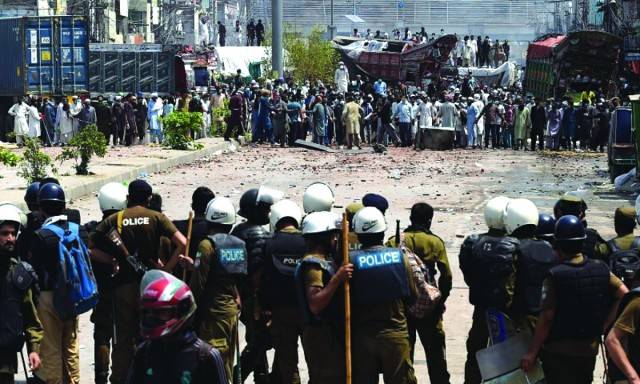
A potentially far bloodier clash between TLP and the government appears to have been avoided for the time being, but not without a costly mistake and a missed opportunity.
First, the costly mistake. In a press conference on Wednesday, the interior minister said that 668 of the 733 arrested TLP workers were set free immediately as part of the agreement, while some FIRs will go through the legal process. Most of those released hailed from south Punjab and Faisalabad. They were released without investigation or trial. Flatteringly, he said that the TLP was a political force and the third major political party in Punjab.
About the ban, he said that the TLP would file an appeal with the Interior Ministry against it within 30 days which will be examined and decided upon by a committee. Keeping in view the hurried manner with scant respect for legalese in which the ban was slammed, it seems obvious that it will also be lifted in a matter of days.
By not taking into account the morale of the police force in making this agreement, the government has made a costly mistake. It is bound to impact adversely on the course of the fight against militancy and militant organizations that hold the state and society to ransom.
Four policemen were killed and hundreds injured in the operation launched by the government, besides casualties among the protestors. Releasing hundreds of activists without facing legal proceedings will have a disastrous impact on the morale of the police force.
Police commanders will find it hard to convince troops that launching them into the operation and then abusing them was in ‘national interest’ and beyond question. Policemen are also human beings, not robots without feelings. The video recording of the interior minister reading out details of the release of all activists placed in the old and new Fourth Schedule must have been so jarring to the ears of policemen.
The police force is often accused, and not without some justification, of extrajudicial killings, torture and extortion. This is true and calls for accountability of the culpable. But it must not justify leaving the police force in a lurch with soul-biting feelings of abandonment in a fight that is billed as an existential fight.
Senior police officers are reported to have complained privately that except one, all other 115 road blocks by TLP across the Punjab had been cleared by it without any bloodshed.
The police should have been appreciated and rewarded for avoiding huge casualties that could have taken place in such a large operation against protestors highly charged with religious sentiments. Dozens of police vehicles were torched, their buildings were attacked and policemen were kidnapped and allegedly tortured. The claim made triumphantly that five police vehicles had been recovered from the protestors seemed a cruel joke. The interior minister could have done much better by reaching out to the police before making public the deal.

Earlier in the National Assembly, while prayers were offered for the protestors killed, there was no word about the policemen who laid down their lives. The Punjab police cannot be blamed if it felt abandoned by the state to the extremists of a proscribed organization.
The parliamentary resolution will no doubt condemn deliberate provocation of sentiments of Muslims. Indeed, the need for it cannot be overstated. It is also important to send, in association with other Muslim countries, a strong message against Islamophobia. It is no less important to pay homage to the fallen policemen.
Now to the missed opportunity. The latest TLP uprising also provided an opportunity to dwell deeper and longer on the Supreme Court verdict in the first TLP dharna in Faizabad in 2017. The verdict highlighted the perception of involvement of state agencies with militant outfits for advancing domestic political agendas. To appreciate the significance and enormity of the opportunity it will be useful to recall in some detail that judgment.
In its 2019 verdict, the SC observed that the report submitted by the ISI did not disclose the “sources of livelihood, place of work, address, funding of their organizations etc: of the TLP leadership. We had inquired whether they paid income tax or had bank accounts, ISI responded by saying that it did not have the mandate to gather such information and therefore was unable to provide answers to our queries.
The learned AGP was thus asked to inform us about the law/rules/ regulations governing ISI and its mandate. The learned AGP tendered a document (in a sealed envelope) which spelled out ISI’s mandate, but requested that the mandate of ISI should not be disclosed. He did not give any reason for such secrecy except that this was also the practice in other countries but did not cite the example of one.
We therefore ascertained whether other countries maintained secrecy about the mandate of their intelligence agencies. The United Kingdom, the United States of America, New Zealand, Australia, Canada and Norway have laws that govern their intelligence agencies and all these laws also disclose their respective mandates.
We are disappointed in the manner in which the government handled this aspect of the case; by ignoring an issue it does not go away. The perception that ISI may be involved in or interferes with matters with which an intelligence agency should not be concerned with, including politics therefore was not put to rest,” the court concluded.
The historic opportunity may have been lost already.
The writer is a former senator
First, the costly mistake. In a press conference on Wednesday, the interior minister said that 668 of the 733 arrested TLP workers were set free immediately as part of the agreement, while some FIRs will go through the legal process. Most of those released hailed from south Punjab and Faisalabad. They were released without investigation or trial. Flatteringly, he said that the TLP was a political force and the third major political party in Punjab.
About the ban, he said that the TLP would file an appeal with the Interior Ministry against it within 30 days which will be examined and decided upon by a committee. Keeping in view the hurried manner with scant respect for legalese in which the ban was slammed, it seems obvious that it will also be lifted in a matter of days.
By not taking into account the morale of the police force in making this agreement, the government has made a costly mistake. It is bound to impact adversely on the course of the fight against militancy and militant organizations that hold the state and society to ransom.
Four policemen were killed and hundreds injured in the operation launched by the government, besides casualties among the protestors. Releasing hundreds of activists without facing legal proceedings will have a disastrous impact on the morale of the police force.
Police commanders will find it hard to convince troops that launching them into the operation and then abusing them was in ‘national interest’ and beyond question. Policemen are also human beings, not robots without feelings. The video recording of the interior minister reading out details of the release of all activists placed in the old and new Fourth Schedule must have been so jarring to the ears of policemen.
The police force is often accused, and not without some justification, of extrajudicial killings, torture and extortion. This is true and calls for accountability of the culpable. But it must not justify leaving the police force in a lurch with soul-biting feelings of abandonment in a fight that is billed as an existential fight.
Senior police officers are reported to have complained privately that except one, all other 115 road blocks by TLP across the Punjab had been cleared by it without any bloodshed.
Police commanders will find it hard to convince troops that launching them into the operation and then abusing them was in ‘national interest’
The police should have been appreciated and rewarded for avoiding huge casualties that could have taken place in such a large operation against protestors highly charged with religious sentiments. Dozens of police vehicles were torched, their buildings were attacked and policemen were kidnapped and allegedly tortured. The claim made triumphantly that five police vehicles had been recovered from the protestors seemed a cruel joke. The interior minister could have done much better by reaching out to the police before making public the deal.

Earlier in the National Assembly, while prayers were offered for the protestors killed, there was no word about the policemen who laid down their lives. The Punjab police cannot be blamed if it felt abandoned by the state to the extremists of a proscribed organization.
The parliamentary resolution will no doubt condemn deliberate provocation of sentiments of Muslims. Indeed, the need for it cannot be overstated. It is also important to send, in association with other Muslim countries, a strong message against Islamophobia. It is no less important to pay homage to the fallen policemen.
Now to the missed opportunity. The latest TLP uprising also provided an opportunity to dwell deeper and longer on the Supreme Court verdict in the first TLP dharna in Faizabad in 2017. The verdict highlighted the perception of involvement of state agencies with militant outfits for advancing domestic political agendas. To appreciate the significance and enormity of the opportunity it will be useful to recall in some detail that judgment.
In its 2019 verdict, the SC observed that the report submitted by the ISI did not disclose the “sources of livelihood, place of work, address, funding of their organizations etc: of the TLP leadership. We had inquired whether they paid income tax or had bank accounts, ISI responded by saying that it did not have the mandate to gather such information and therefore was unable to provide answers to our queries.
The learned AGP was thus asked to inform us about the law/rules/ regulations governing ISI and its mandate. The learned AGP tendered a document (in a sealed envelope) which spelled out ISI’s mandate, but requested that the mandate of ISI should not be disclosed. He did not give any reason for such secrecy except that this was also the practice in other countries but did not cite the example of one.
We therefore ascertained whether other countries maintained secrecy about the mandate of their intelligence agencies. The United Kingdom, the United States of America, New Zealand, Australia, Canada and Norway have laws that govern their intelligence agencies and all these laws also disclose their respective mandates.
We are disappointed in the manner in which the government handled this aspect of the case; by ignoring an issue it does not go away. The perception that ISI may be involved in or interferes with matters with which an intelligence agency should not be concerned with, including politics therefore was not put to rest,” the court concluded.
The historic opportunity may have been lost already.
The writer is a former senator

